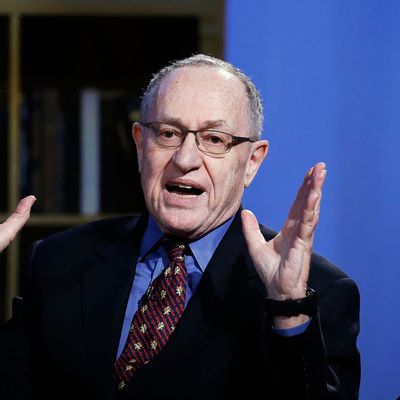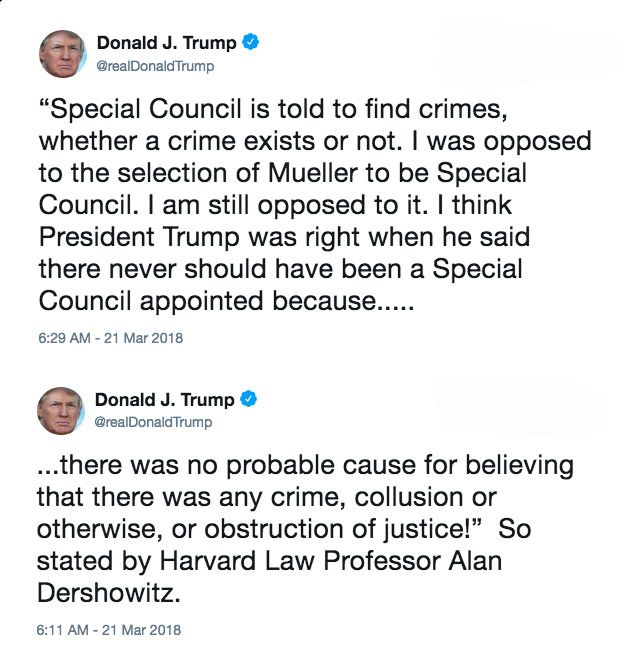
Alan Dershowitz has carved out a role as Donald Trump’s favorite legal mind, a position he has previously held for such figures as Claus von Bülow and O.J. Simpson. (The common thread among all these figures is not that they know they are completely innocent.) Last night, Dershowitz appeared on Lou Dobbs’s program to express his belief that the Mueller investigation should be dissolved. (Dobbs agreed, and proceeded to argue that Trump is entitled to subject the Department of Justice to his complete personal control, a point Dershowitz did not contest.) This morning, Trump, likely DVRing through last night’s Fox News highlights, excitedly tweeted out paraphrased, poorly spelled excerpts of Dershowitz’s commentary:

Dershowitz was using his appearance with Dobbs to tease an argument he spells out at greater length in an op-ed in the Hill. The argument is worth analyzing in more detail for what it reveals about Trump’s defense. You might think a lawyer as experienced and well-credentialed as Dershowitz could manage to put together a halfway plausible argument. Instead he has produced one that would not maintain enough superficial plausibility to sustain an episode of Matlock.
What follows is the entire op-ed, interspersed with commentary.
President Trump is right in saying that a special counsel should never have been appointed to investigate the so-called Russian connection. There was no evidence of any crime committed by the Trump administration.
First of all, the special counsel is not investigating “the Trump administration.” He is investigating actions by Russia, the Trump campaign, and, secondarily, efforts by the Trump administration to obstruct the investigation into the latter two.
Even though we don’t yet have all the facts, there is already ample evidence of crimes committed by the Trump campaign. Trump’s campaign manager, Paul Manafort, has been indicted for money laundering in relation to his long-standing business dealings with Russia, which included running a campaign to elect a pro-Russian president in another country. Manafort’s partner, Rick Gates, has already pleaded guilty. Two other campaign aides, Michael Flynn and George Papadopoulos, have pleaded guilty to lying about their contacts with Russia.
And that’s just the evidence presented so far in the form of indictments. There is already a lot of additional public information — the Trump Tower meeting, Roger Stone’s pattern of statements — suggesting Trump’s campaign was receptive to Russian efforts on its behalf, which included illegal theft of Democratic emails.
The remainder of Dershowitz’s argument rests on the premise that Trump’s campaign did nothing illegal. It is an extremely shaky foundation, to say the least.
But there was plenty of evidence that Russian operatives had tried to interfere with the 2016 presidential election, and perhaps other elections, in the hope of destabilizing democracy.
Dershowitz is defining the Russian goal as “destabilizing democracy,” which is what Trump also claims. But American intelligence has concluded its goal was not only to destabilize democracy but to help Trump win.
Yet, appointing a special counsel to look for crimes, behind the closed doors of a grand jury, was precisely the wrong way to address this ongoing challenge to our democracy.
The right way would have been (and still is) to appoint a nonpartisan investigative commission, such as the one appointed following the terrorist attacks of 9/11, to conduct a broad and open investigation of the Russian involvement in our elections. This is what other democracies, such as Great Britain and Israel, do in response to systemic problems. The virtue of such a commission is precisely the nonpartisan credibility of its objective experts, who have no political stake in the outcome.
Mueller’s investigation is nonpartisan, but Trump and his allies have relentlessly sought to smear it as partisan.
Such a commission could have informed the American public of what Russia did and how to prevent it from doing it again. It would not seek partisan benefit from its findings, the way congressional committees invariably do. Nor would it be searching for crimes in an effort to criminalize political sins, the way special counsels do to justify their existence and budget. Its only job would be to gather information and make recommendations.
Note what Dershowitz is saying here: Nobody should be investigating any crimes that Trump’s campaign may have committed, nor any obstruction of justice Trump’s administration may have committed to to prevent that investigation. Russians should be the only target.
The vice of a special counsel is that he is supposed to find crimes, and if he comes up empty-handed, after spending lots of taxpayer money, then he is deemed a failure.
It is true that a special counsel could be swayed by an incentive to find a crime even if one does not exist. That would seem to be less of a concern given that Mueller has already found actual crimes.
If he can’t charge the designated target — in this case, the president — he must at least charge some of those close to the target, even if it is for crimes unrelated to the special counsel’s core mandate. By indicting these low-hanging fruits, he shows that he is trying. Maybe those lesser defendants will flip and sing against higher-ups, but the problem is that the pressure to sing may cause certain defendants to “compose,” meaning make up or enhance evidence in order to get a better deal for themselves.
It’s also true that a special counsel could pressure lesser defendants into making up crimes by higher-ups. But any prosecutor can do this. Dershowitz is making a case against the way prosecutors charge terrorist cells or Mafia families or two guys who knock over a liquor store.
In this case, the appointment of a special counsel has done more harm than good. It has politicized our justice system beyond repair.
Note that Dershowitz began by describing a hypothetical scenario, but now has switched over to using language — “has done” — implying that this hypothetical is reality.
The FBI deputy director has been fired for leaking and lying.
Wait a second. Yes, Andrew McCabe was fired for allegedly leaking and lying. But the putative cause of his termination was related to the FBI’s investigation of Hillary Clinton. Supposedly the behavior that caused McCabe’s firing has nothing to do with the Russia investigation at all. But Dershowitz is saying the firing was caused by the appointment of a special counsel. So by Dershowitz’s own account here, Trump or his allies engineered the firing of an FBI agent in order to discredit him as a witness in the Russia investigation! And Dershowitz concludes that this just shows why we need to close down the Russia investigation!
His testimony appears to be in conflict with that of the former FBI director as to whether the leaks were authorized. Messages by high-ranking FBI agents suggest strong bias against Trump.
Those agents also had a strong bias against Hillary Clinton and Bernie Sanders, and seemed most in tune with John Kasich. In any case, they recused themselves from the investigation, so their view is not relevant.
A tweet by the former CIA director reveals equally strong negative views of the president. Perhaps these revelations prove nothing more than that law enforcement and national security officials are human and hold political views like everyone else.
Or maybe the former CIA director, who is also not involved in any way in the special counsel’s investigation, has developed strongly anti-Trump views because he has seen some intelligence indicating Trump has done some really bad things.
But these views are not supposed to influence their decisions. In our age of hyperpartisanship, the public has understandably lost confidence in the ability and willingness of our leaders to separate their political views from their law enforcement decisions. This is not all attributable to the appointment of the special counsel, but the criminalization of political differences on both sides of the aisle has certainly contributed to the atmosphere of distrust in our justice system.
The public has lost faith in the leadership of the Justice Department and the FBI.
In fact, the public as a whole does still trust the FBI. Yes, Trump has helped drive down trust through his relentless attacks on the agency. Dershowitz’s response is to amplify those attacks and then insist the FBI can’t investigate Trump because people don’t trust it.
They don’t trust congressional investigative committees.
They don’t know whom to believe when they hear conflicting accounts. There are leaks galore followed by denials of leaks. It’s a total mess.
Mueller’s investigation has in fact been almost completely free of leaks.
And what do we have to show for it? Just a handful of low-level indictments based largely on alleged crimes that are either unrelated or only marginally related to Russia’s attempt to influence our presidential election in 2016.
The “low-level indictments” include the person who managed Trump’s campaign and the former director of the National Security Council. So far.
It’s not too late to try to repair some of the damage done. Let Congress now appoint a nonpartisan commission to conduct a transparent investigation of Russia’s efforts to influence our elections. Let the special counsel suspend his investigation until the nonpartisan commission issues its report.
There’s no reason why a nonpartisan commission has to mean stopping Mueller’s investigation. You could have both. In fact, it is Trump’s critics who have proposed a commission like the one Dershowitz is advocating, and Trump’s allies who have blocked it. Dershowitz does not mention that.
If the report identifies crimes and criminals, there will be time enough to indict and prosecute. Right now, we need the nonpartisan truth, because we aren’t getting it from the special counsel.
Like almost every high-level defense of Trump, Dershowitz ignores the obvious reality that Trump believes law enforcement should be personally loyal to him, ignoring any crimes he and his friends may have committed while ruthlessly prosecuting his adversaries. This ought to be the primary context for any analysis of Trump’s standoff with the FBI, but instead Dershowitz wishes it away, and reimagines Trump as an innocent man hounded by a perfidious and unethical prosecutor. Is Dershowitz auditioning for a role as Trump’s lawyer? If so, and if this is the best case Dershowitz can make, Trump is in a lot of trouble.






























